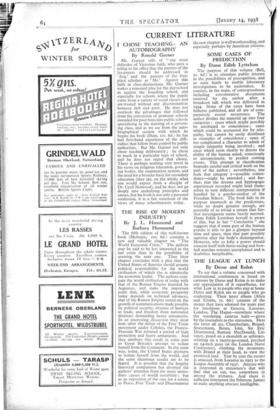THE RISE OF MODERN INDUSTRY By J. L. Hammond and
Barbara Hammond The fifth edition of this well-known book (Methuen, los. 6d.) contains a new and valuable chapter on " The World Economic Crisis." The authors may be said to be less interested in the last crisis than in the possibility of averting the next one. Thus their chapter concludes with a plea that the United States of America should assume political responsibility for the world civilisation of which she is admittedly the economic leader. The authors com- pare the world civilisation of today with that of the Roman Empire founded by Augustus, and make the important point that, while economic prosperity today depends on technical advances, that of the Roman Empire rested on the growth of communications made possible by political security, absence of barriers to trade, and freedom from nationalist divisions demanding heavy armaments. In an interesting discussion they show how, after the defeat of the Free Trade movement under Cobden, the Franco-. Prussian War initiated a period of high protection and heavy armaments. And they attribute this result in some part to Great Britain's attempt to isolate herself from the Continent. In the same way, today, the United States attempts to isolate herself from the world, and the same disastrous results are to be feared. It is possible that the lengthy historical comparison has diverted the authors' attention from the more imme- diate causes of world instability ; but as an exposition of the case for a return to Peace, Free Trade and Disarmament
the new chapter is well worth reading, and especially perhaps by American citizens.






































 Previous page
Previous page